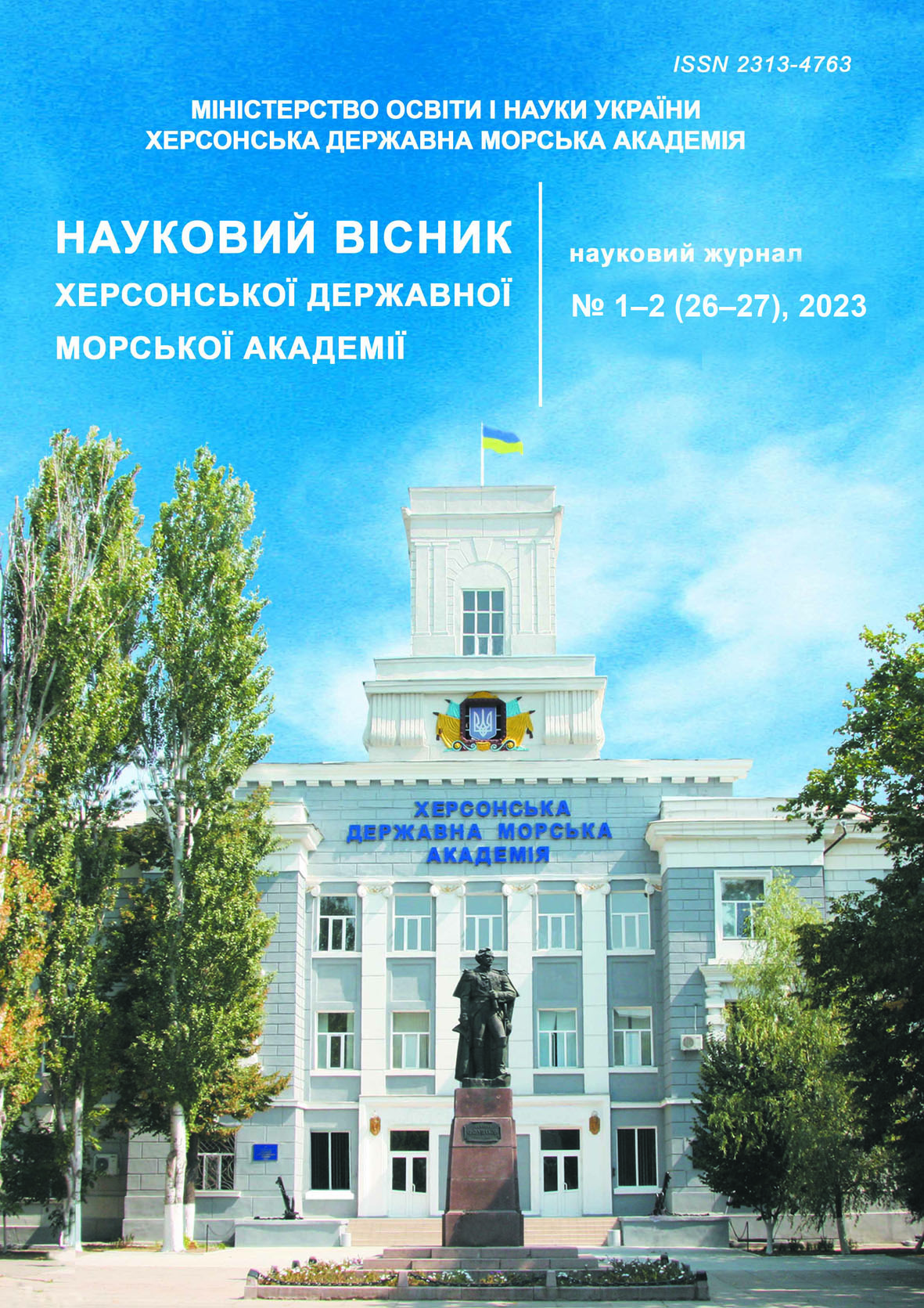MATHEMATICAL MODELING AND ANALYSIS OF THE RELIABILITY OF THE NAVIGATION COMPLEX
https://doi.org/10.33815/2313-4763.2023.1-2.26-27.082-095
Abstract
The article examines the navigational complex as a queuing system and defines the correlation between the difficulty of sailing conditions and system capability. A mathematical model for calculating the servicing probability was developed. Recommendations for necessary measures to maintain the appropriate level of system reliability are proposed.The implementation issues of the e-Navigation concept in the International Maritime Organization (IMO) are examined in this paper. In 2014, the IMO adopted the e-Navigation Strategic Implementation Plan (SIP). This plan aims to assess the impact of e-Navigation applications in reducing navigational accidents, such as ship collisions and groundings, as defined by the International Convention for the Safety of Life at Sea (SOLAS). The expected outcome is a substantial decrease in such accidents, projected to be around 65 percent. The responsibility for the safety of navigation and efficient vessel traffic lies with the Member States of IMO, both at the international and national levels. In order to introduce new concepts and innovative systems into vessel traffic, it is essential to thoroughly evaluate their potential effects on both SOLAS ships and non-SOLAS ships. The objective of this paper is to provide a detailed and well-founded assessment of the potential benefits of e-Navigation. To achieve this, we will be exploring and utilizing the International Maritime Organization's (IMO) methodology for measuring these effects. Additionally, we will be examining the application of e-Navigation solutions to non-SOLAS ships, ensuring a comprehensive analysis. In this discourse, the issue encompassing the identification and resolution of faults in information measuring systems is deliberated upon. Considered are the methods used for reconditioning defective systems following information failures. It is recommended to enhance continuous measurements by incorporating specific attributes related to sailing conditions and the technical state of the systems.
References
Yip, Tsz L., Sahin, B. (2020). Technical factor in maritime accidents: an index for systematic failure analysis. IAME 2020 Conference, 1–11. doi: 10.17632/8p9hsvfhmx.2.
Baldauf, M., Hong, S.-B. (2016). Improving and assessing the impact of e-navigation applications. International Journal of e-Navigation and Maritime Economy, 4, 1–12. doi: 10.1016/j.enavi.2016.06.001.
Dmitriev, S. P., Osipov, A. V., Koshaev, D. A. (2006). Detection of information failures in marine navigation systems and their reconditioning. 6th IFAC Symposium on Fault Detection, Supervision and Safety of Technical Processes, 39(13). doi: 10.3182/20060829-4-CN-2909.00248.
Felski, A., & Zwolak, K. (2020). The Ocean-Going Autonomous Ship – Challenges and Threats. Journal of Marine Science and Engineering, 8(1), 41.
Wróbel, K., Montewka, J., & Kujala, P. (2018a). System-theoretic approach to safety ofremotely-controlled merchant vessel. Ocean Engineering, 152, 334–345.
Wróbel, K., Krata, P., & Montewka, J. (2019). Preliminary results of a system-theoretic assessment of maritime autonomous surface ships’ safety. TransNav, International Journal on Marine Navigation and Safety of Sea Transportation, 13(4).
T.-W. Lee, P., Bolbot, V., Theotokatos, G., Boulougouris E. & Vassalos, D. (2021). Fault tree analysis of the autonomous navigation for maritime autonomous surface ships. Proceedings of the 1st International Conference on the Stability and Safety of Ships and Ocean Vehicles, 1, 1–10.
Aksu, S. (2019). Assessing compartment-wide damage consequences in ships and offshore vessels using Fault Trees with System Location Attribution. Ocean Engineering, 192, 106510.
Banda, O. A. V., Kannos, S., Goerlandt, F., van Gelder, P. H., Bergström, M., & Kujala, P. (2019). A systemic hazard analysis and management process for the concept design phase of an autonomous vessel. Reliability Engineering & System Safety, 191, 106584.
Ivanov, A. A. & Ivanovsky, N. U. (2013). Study of the stability of the navigation system of a sea vessel. Information and control systems, 1/9(61), 65–68.
Abramov, G. S., Makarchuk, D. V., Nosov, P. S. & Zinchenko, S. M. (2021). The ship officer as a failure-prone single-channel queueing system. Materials of the 13th international scientific and practical conference “Modern information and innovation technologies in transport (MINTT-2021)”, 13, 157–162.
Aubakirov, S. K. & Selivyorstov, P. Y. (2016). System of mass service. Post capacity. Bulletin of Science and Education, 6(18), 44–47.
Abramov, G. S., Makarchuk, D. V. & Plotnikov, V. I. (2023). Analysis of the stability of marine navigation complex systems from the point of view of the QS. Materials of the 15th international scientific and practical conference “Modern information and innovation technologies in transport (MINTT-2023)”, 15, 244–249.
Rausand, M., Hoyland, A. (2021). System Reliability Theory: Models,Statistical Methods, and Application. Wiley.
Melani, A. H. A., Murad, C. A., Caminada Netto, A., Souza, G. F. M.d., Nabeta, S. I. (2018).Criticality-based maintenance of a coal-fired power plant. Energy, 147:767–781. doi: 10.1016/j.energy.2018.01.048.
Daya, A. A., Lazakis, I. (2023). Developing an advanced reliability analysis framework for marine systems operations and maintenance. Ocean Engineering, 272, 1–17. doi: 10.1016/j.oceaneng.2023.113766.
Jeong, B., Lee, B. S., Zhou, P., Ha, S.-m. (2018). Quantitative risk assessment of medium-sized floating regasification units using system hierarchical modelling. Ocean Engineering, 151:390–408.
Tan, Z., Li, J., Wu, Z., Zheng, J., He, W. (2011). An evaluation of maintenance strategy using risk based inspection. Safety Science, 49 (6), 852–860.
Kiran, D. R. (2017). Failure Modes and Effects Analysis. Total Quality Management. Key Concepts and Case Studies, Butterworth-Heinemann, 373–389. doi: 10.1016/B978-0-12-811035-5.00026-X.
Abramov, G. S., Plotnikov, V. I. & Zinoviev, V. I. (2023). Analysis of the reliability of the navigation complex and its influence on the functioning of the maritime logistics system. Materials of the 1st International Scientific and Practical Conference “Transport, port, logistics, security: modern-day challenges and development prospects”, 1, 17–29.
Columbia Shipmanagement (2018). Bridge Operations Manual BOPR-01.2.
Ministry of Oceans and Fisheries (2015). The study on systems to prevent safety accidents in maritime sectors, Seoul: Author.






